As you use them repeatedly, you& #39;ll develop a sense for what& #39;s good code and what& #39;s bad code.
I& #39;ll also sprinkle some general Laravel code advice in between these tactics.
THREAD
Using some "macro" philosophy for structuring your code, like hexagonal architecture or DDD won& #39;t save you.
A clean codebase is the result of constant good decisions at the micro level.
The code will be cleaner & more readable and you will see understandable exceptions if something goes wrong. No half-passing edge cases.
Too much nesting & else statements tend to make code harder to read.
Opening an array with [ and indenting the values tends to work well. Same with long function parameter values.
Other good places to split lines are chained calls and closures.
The opposite of the previous tip. Sometimes the value comes from a complex call and as such, creating a variable improves readability & removes the need for a comment.
Remember that context matters & your end goal is readability
Your controllers should be simple. They should say things like "create invoice for order". They shouldn& #39;t be concerned with the details of how your database is structured.
Leave that to the model.
Let& #39;s expand on the previous example. Sometimes, creating a class for a single action can clean things up.
Models should encapsulate the business logic related to them, but they shouldn& #39;t be too big.
They& #39;re a great place to hide complex validation logic.
But beware of exactly that — hiding things. When your validation logic is simple, there& #39;s nothing wrong with doing it in the controller. Moving it to a form request makes it less explicit
Consider offloading some logic from controllers to events. For example, when creating models.
The benefit is that creating these models will work the same everywhere (controllers, jobs, ...) and the controller has one less worry about the details of the DB schema
If some method is too long or complex, and it& #39;s hard to understand what exactly is happening, split the logic into multiple methods.
If you repeat some code a lot, consider if extracting it to a helper function would make the code cleaner.
Sometimes people put helpers into a class.
Beware, it can get messy. This is a class with only static methods used as helper functions. It& #39;s usually better to put these methods into classes with related logic or just keep them as global functions.
Know the difference between static/instance methods & variables and private/protected/public visibility. Also learn how Laravel uses magic methods.
You don& #39;t need this as a beginner, but as your code grows, it& #39;s crucial.
This ties the previous tweet with the other tips here. OOP exists to make your code more readable, use it. Don& #39;t just write 400 line long procedural code in controller actions.
Here& #39;s code from my first Laravel project
Avoid having classes that deal with many unrelated things
But, for the love of god, don& #39;t create a class for every single thing. You& #39;re trying to write clean code. You& #39;re not trying to please the separation gods
1. The function has too many responsibilities. Separate.
2. The responsibilities are fine, but you should refactor the long signature.
Below are two tactics for the fixing second case.
Rather than passing a huge amount of arguments in a specific order, consider creating an object with properties to store this data.
Bonus points if you can find that some behavior can be moved into to this object.
You can also create objects with fluent APIs. Gradually add data by with separate calls, and only require the absolute minimum in the constructor.
Each method will return $this, so you can stop at any call.
Creating custom collections can be a great way to achieve more expressive syntax. Consider this example with order totals.
Don& #39;t think that long variable/method names are wrong. They& #39;re not. They& #39;re expressive.
Better to call a longer method than a short one and check the docblock to understand what it does
Same with variables. Don& #39;t use nonsense 3-letters abbreviations
If you can, only use the 7 CRUD actions in your controllers. Often even fewer.
Don& #39;t create controllers with 20 methods.
More shorter controllers is better. https://www.youtube.com/watch?v=MF0jFKvS4SI">https://www.youtube.com/watch...
Rather than thinking "what can this object do", think about "what can be done with this object". Exceptions apply, such as with action classes, but this is a good rule of thumb.
https://www.youtube.com/watch?v=dfgtKb-VpRk">https://www.youtube.com/watch...
Adding methods to classes where they belong is cleaner than creating action classes for everything, but it can make the classes grow big
Consider using traits. They& #39;re meant *primarily* for code reuse, but there& #39;s nothing wrong with single-use traits
Similar to single-use traits.
This tactic is great when you have a very long template and you want to make it more manageable.
There& #39;s nothing wrong with @including headers and footers in layouts, or things like complex forms in page views.
Sometimes you may have multiple classes with the same name. Rather than importing them with an alias, import the namespaces.
Rather than writing complex where() clauses, create query scopes with expressive names.
This will make your e.g. controllers have to know less about the database structure and your code will be cleaner.
If you want to retrieve some data from a model, create an accessor.
Keep methods for things that *change* the model in some way.
You can store things like "results per page" in config files. Don& #39;t add them to the app config file though. Create your own. In my e-commerce project, I use config/shop.php.
Instead of writing controller actions like PostController@index, use the callable array syntax [PostController::class, & #39;index& #39;].
You will be able to navigate to the class by clicking PostController.
If you have a complex route action, consider moving it to a separate controller.
For OrderController::create, you& #39;d create CreateOrderController.
Another solution is to move that logic to an action class — do what works best in your case.
Install extensions, write annotations, use typehints. Your IDE will help you with getting your code working correctly, which lets you spend more energy on writing code that& #39;s also readable.
PHP has many great operators that can replace ugly if checks. Memorize them.
Above you can see that I use space between ! and the value I& #39;m negating. I like this, because it makes it clear that the value is being negated. I do the same around dots.
Decide if you like it. It can (imo) clean up your code.
This is largely a matter of personal preference, but calling a global function instead of having to import a class and statically call a method feels nicer to me.
Bonus points for session(& #39;key& #39;) syntax.
You can make your Blade templates more expressive by creating custom directives. For example, rather than checking if the user has the admin role, you could use @admin.
Sometimes you may want to execute DB queries in blade. There are some ok use cases for this, such as in layout files.
But if it& #39;s a view returned by a controller, pass the data in the view data instead.
ALWAYS use strict comparison (=== and !==). If needed, cast things go the correct type before comparing. Better than weird == results
Also consider enabling strict types in your code. This will prevent passing variables of wrong data types to functions
Many people will disagree with this, because they do it. But it makes no sense.
There& #39;s no point in using docblocks when they don& #39;t give any extra information. If the typehint is enough, don& #39;t add a docblock.
That& #39;s just noise.
If you validate some resource& #39;s attributes on multiple places, you definitely want to centralize these validation rules, so that you don& #39;t change them in one place but forget about the other places. https://twitter.com/LiamHammett/status/1260252814158282752">https://twitter.com/LiamHamme...
Don& #39;t turn all arrays into collections just because Laravel offers them, but DO turn arrays into collections when you can make use of collection syntax to clean up your code.
Functional code can both clean things up and make them impossible to understand. Refactor common loops into functional calls, but don& #39;t write stupidly complex reduce()s just to avoid writing a loop. There& #39;s a use case for both.
Before writing a comment, ask yourself if you could rename some things or create variables to improve readability. If that& #39;s not possible, write the comment in a way that both your colleagues and you will understand in 6 months.
Above I said that moving business logic to action/service classes is good. But context matters
Here& #39;s code design advice from a popular "Laravel best practices" repo. There& #39;s absolutely no reason to put a 3-line check into a class. That& #39;s just overengineered
*Your goal to write more readable code.*
Your goal is NOT to do what someone said on the internet
These tips are just tactics that tend to help with clean code. Keep your end goal in mind and ask yourself "is this better?"
https://twitter.com/samuelstancl/status/1272912997757919233">https://twitter.com/samuelsta...

 Read on Twitter
Read on Twitter Instead of writing repetitive `else if` statements, use an array to look up the wanted value based on the key you have.The code will be cleaner & more readable and you will see understandable exceptions if something goes wrong. No half-passing edge cases." title="https://abs.twimg.com/emoji/v2/... draggable="false" alt="👉" title="Rückhand Zeigefinger nach rechts" aria-label="Emoji: Rückhand Zeigefinger nach rechts"> Instead of writing repetitive `else if` statements, use an array to look up the wanted value based on the key you have.The code will be cleaner & more readable and you will see understandable exceptions if something goes wrong. No half-passing edge cases." class="img-responsive" style="max-width:100%;"/>
Instead of writing repetitive `else if` statements, use an array to look up the wanted value based on the key you have.The code will be cleaner & more readable and you will see understandable exceptions if something goes wrong. No half-passing edge cases." title="https://abs.twimg.com/emoji/v2/... draggable="false" alt="👉" title="Rückhand Zeigefinger nach rechts" aria-label="Emoji: Rückhand Zeigefinger nach rechts"> Instead of writing repetitive `else if` statements, use an array to look up the wanted value based on the key you have.The code will be cleaner & more readable and you will see understandable exceptions if something goes wrong. No half-passing edge cases." class="img-responsive" style="max-width:100%;"/>
 Try to avoid unnecessary nesting by returning a value early.Too much nesting & else statements tend to make code harder to read." title="https://abs.twimg.com/emoji/v2/... draggable="false" alt="👉" title="Rückhand Zeigefinger nach rechts" aria-label="Emoji: Rückhand Zeigefinger nach rechts"> Try to avoid unnecessary nesting by returning a value early.Too much nesting & else statements tend to make code harder to read." class="img-responsive" style="max-width:100%;"/>
Try to avoid unnecessary nesting by returning a value early.Too much nesting & else statements tend to make code harder to read." title="https://abs.twimg.com/emoji/v2/... draggable="false" alt="👉" title="Rückhand Zeigefinger nach rechts" aria-label="Emoji: Rückhand Zeigefinger nach rechts"> Try to avoid unnecessary nesting by returning a value early.Too much nesting & else statements tend to make code harder to read." class="img-responsive" style="max-width:100%;"/>
 Don& #39;t split lines at random places, but don& #39;t make them too long either.Opening an array with [ and indenting the values tends to work well. Same with long function parameter values.Other good places to split lines are chained calls and closures." title="https://abs.twimg.com/emoji/v2/... draggable="false" alt="👉" title="Rückhand Zeigefinger nach rechts" aria-label="Emoji: Rückhand Zeigefinger nach rechts"> Don& #39;t split lines at random places, but don& #39;t make them too long either.Opening an array with [ and indenting the values tends to work well. Same with long function parameter values.Other good places to split lines are chained calls and closures." class="img-responsive" style="max-width:100%;"/>
Don& #39;t split lines at random places, but don& #39;t make them too long either.Opening an array with [ and indenting the values tends to work well. Same with long function parameter values.Other good places to split lines are chained calls and closures." title="https://abs.twimg.com/emoji/v2/... draggable="false" alt="👉" title="Rückhand Zeigefinger nach rechts" aria-label="Emoji: Rückhand Zeigefinger nach rechts"> Don& #39;t split lines at random places, but don& #39;t make them too long either.Opening an array with [ and indenting the values tends to work well. Same with long function parameter values.Other good places to split lines are chained calls and closures." class="img-responsive" style="max-width:100%;"/>
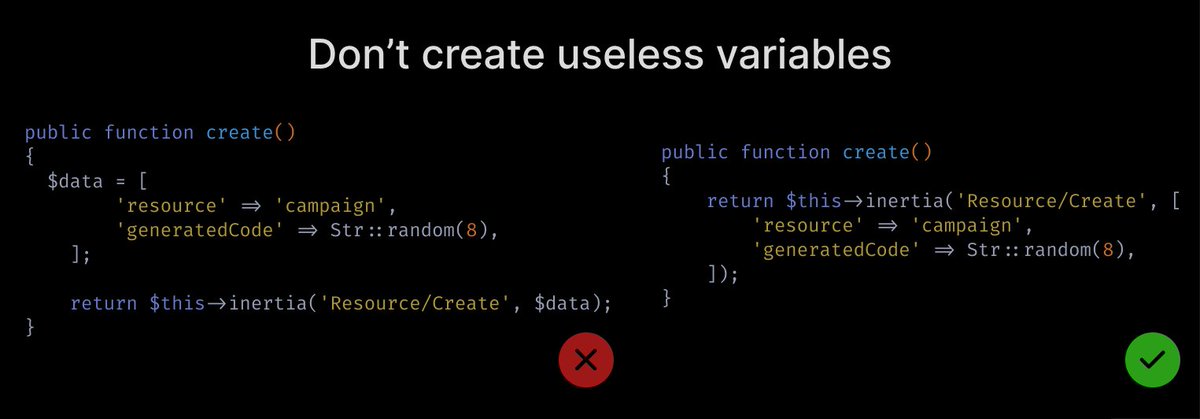 Don& #39;t create variables when you can just pass the value directly." title="https://abs.twimg.com/emoji/v2/... draggable="false" alt="👉" title="Rückhand Zeigefinger nach rechts" aria-label="Emoji: Rückhand Zeigefinger nach rechts"> Don& #39;t create variables when you can just pass the value directly." class="img-responsive" style="max-width:100%;"/>
Don& #39;t create variables when you can just pass the value directly." title="https://abs.twimg.com/emoji/v2/... draggable="false" alt="👉" title="Rückhand Zeigefinger nach rechts" aria-label="Emoji: Rückhand Zeigefinger nach rechts"> Don& #39;t create variables when you can just pass the value directly." class="img-responsive" style="max-width:100%;"/>
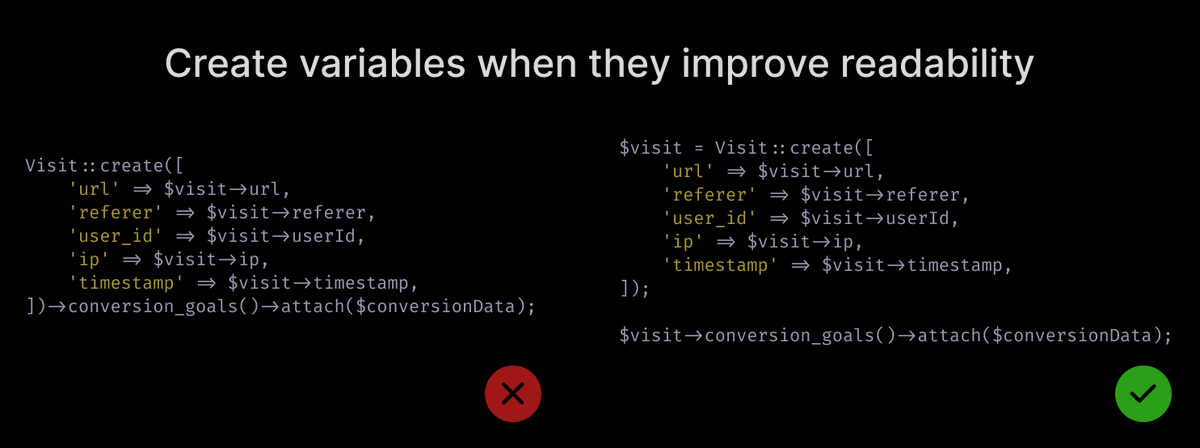 Create variables when they improve readabilityThe opposite of the previous tip. Sometimes the value comes from a complex call and as such, creating a variable improves readability & removes the need for a comment.Remember that context matters & your end goal is readability" title="https://abs.twimg.com/emoji/v2/... draggable="false" alt="👉" title="Rückhand Zeigefinger nach rechts" aria-label="Emoji: Rückhand Zeigefinger nach rechts"> Create variables when they improve readabilityThe opposite of the previous tip. Sometimes the value comes from a complex call and as such, creating a variable improves readability & removes the need for a comment.Remember that context matters & your end goal is readability" class="img-responsive" style="max-width:100%;"/>
Create variables when they improve readabilityThe opposite of the previous tip. Sometimes the value comes from a complex call and as such, creating a variable improves readability & removes the need for a comment.Remember that context matters & your end goal is readability" title="https://abs.twimg.com/emoji/v2/... draggable="false" alt="👉" title="Rückhand Zeigefinger nach rechts" aria-label="Emoji: Rückhand Zeigefinger nach rechts"> Create variables when they improve readabilityThe opposite of the previous tip. Sometimes the value comes from a complex call and as such, creating a variable improves readability & removes the need for a comment.Remember that context matters & your end goal is readability" class="img-responsive" style="max-width:100%;"/>
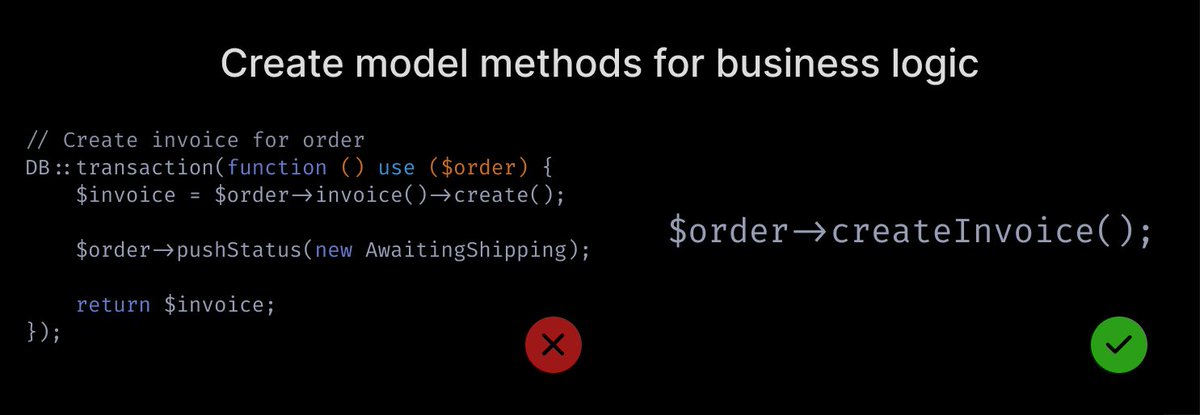 Create model methods for business logicYour controllers should be simple. They should say things like "create invoice for order". They shouldn& #39;t be concerned with the details of how your database is structured.Leave that to the model." title="https://abs.twimg.com/emoji/v2/... draggable="false" alt="👉" title="Rückhand Zeigefinger nach rechts" aria-label="Emoji: Rückhand Zeigefinger nach rechts"> Create model methods for business logicYour controllers should be simple. They should say things like "create invoice for order". They shouldn& #39;t be concerned with the details of how your database is structured.Leave that to the model." class="img-responsive" style="max-width:100%;"/>
Create model methods for business logicYour controllers should be simple. They should say things like "create invoice for order". They shouldn& #39;t be concerned with the details of how your database is structured.Leave that to the model." title="https://abs.twimg.com/emoji/v2/... draggable="false" alt="👉" title="Rückhand Zeigefinger nach rechts" aria-label="Emoji: Rückhand Zeigefinger nach rechts"> Create model methods for business logicYour controllers should be simple. They should say things like "create invoice for order". They shouldn& #39;t be concerned with the details of how your database is structured.Leave that to the model." class="img-responsive" style="max-width:100%;"/>
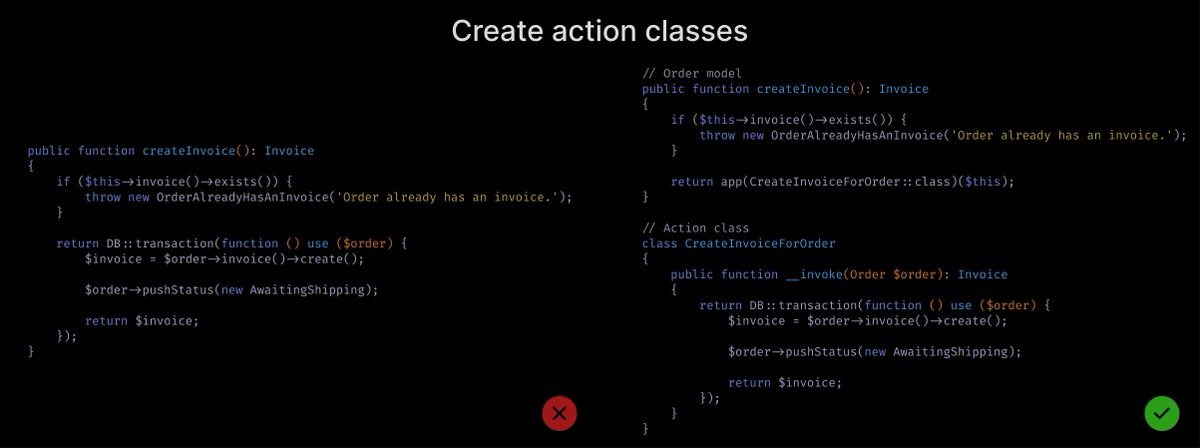 Create action classesLet& #39;s expand on the previous example. Sometimes, creating a class for a single action can clean things up.Models should encapsulate the business logic related to them, but they shouldn& #39;t be too big." title="https://abs.twimg.com/emoji/v2/... draggable="false" alt="👉" title="Rückhand Zeigefinger nach rechts" aria-label="Emoji: Rückhand Zeigefinger nach rechts"> Create action classesLet& #39;s expand on the previous example. Sometimes, creating a class for a single action can clean things up.Models should encapsulate the business logic related to them, but they shouldn& #39;t be too big." class="img-responsive" style="max-width:100%;"/>
Create action classesLet& #39;s expand on the previous example. Sometimes, creating a class for a single action can clean things up.Models should encapsulate the business logic related to them, but they shouldn& #39;t be too big." title="https://abs.twimg.com/emoji/v2/... draggable="false" alt="👉" title="Rückhand Zeigefinger nach rechts" aria-label="Emoji: Rückhand Zeigefinger nach rechts"> Create action classesLet& #39;s expand on the previous example. Sometimes, creating a class for a single action can clean things up.Models should encapsulate the business logic related to them, but they shouldn& #39;t be too big." class="img-responsive" style="max-width:100%;"/>
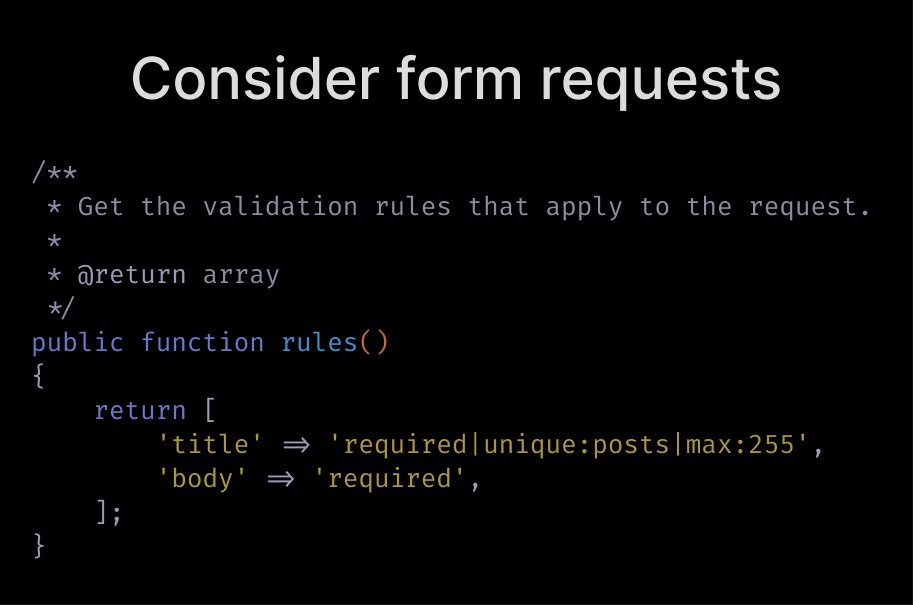 Consider using form requests.They& #39;re a great place to hide complex validation logic.But beware of exactly that — hiding things. When your validation logic is simple, there& #39;s nothing wrong with doing it in the controller. Moving it to a form request makes it less explicit" title="https://abs.twimg.com/emoji/v2/... draggable="false" alt="👉" title="Rückhand Zeigefinger nach rechts" aria-label="Emoji: Rückhand Zeigefinger nach rechts"> Consider using form requests.They& #39;re a great place to hide complex validation logic.But beware of exactly that — hiding things. When your validation logic is simple, there& #39;s nothing wrong with doing it in the controller. Moving it to a form request makes it less explicit" class="img-responsive" style="max-width:100%;"/>
Consider using form requests.They& #39;re a great place to hide complex validation logic.But beware of exactly that — hiding things. When your validation logic is simple, there& #39;s nothing wrong with doing it in the controller. Moving it to a form request makes it less explicit" title="https://abs.twimg.com/emoji/v2/... draggable="false" alt="👉" title="Rückhand Zeigefinger nach rechts" aria-label="Emoji: Rückhand Zeigefinger nach rechts"> Consider using form requests.They& #39;re a great place to hide complex validation logic.But beware of exactly that — hiding things. When your validation logic is simple, there& #39;s nothing wrong with doing it in the controller. Moving it to a form request makes it less explicit" class="img-responsive" style="max-width:100%;"/>
 Use events.Consider offloading some logic from controllers to events. For example, when creating models.The benefit is that creating these models will work the same everywhere (controllers, jobs, ...) and the controller has one less worry about the details of the DB schema" title="https://abs.twimg.com/emoji/v2/... draggable="false" alt="👉" title="Rückhand Zeigefinger nach rechts" aria-label="Emoji: Rückhand Zeigefinger nach rechts"> Use events.Consider offloading some logic from controllers to events. For example, when creating models.The benefit is that creating these models will work the same everywhere (controllers, jobs, ...) and the controller has one less worry about the details of the DB schema" class="img-responsive" style="max-width:100%;"/>
Use events.Consider offloading some logic from controllers to events. For example, when creating models.The benefit is that creating these models will work the same everywhere (controllers, jobs, ...) and the controller has one less worry about the details of the DB schema" title="https://abs.twimg.com/emoji/v2/... draggable="false" alt="👉" title="Rückhand Zeigefinger nach rechts" aria-label="Emoji: Rückhand Zeigefinger nach rechts"> Use events.Consider offloading some logic from controllers to events. For example, when creating models.The benefit is that creating these models will work the same everywhere (controllers, jobs, ...) and the controller has one less worry about the details of the DB schema" class="img-responsive" style="max-width:100%;"/>
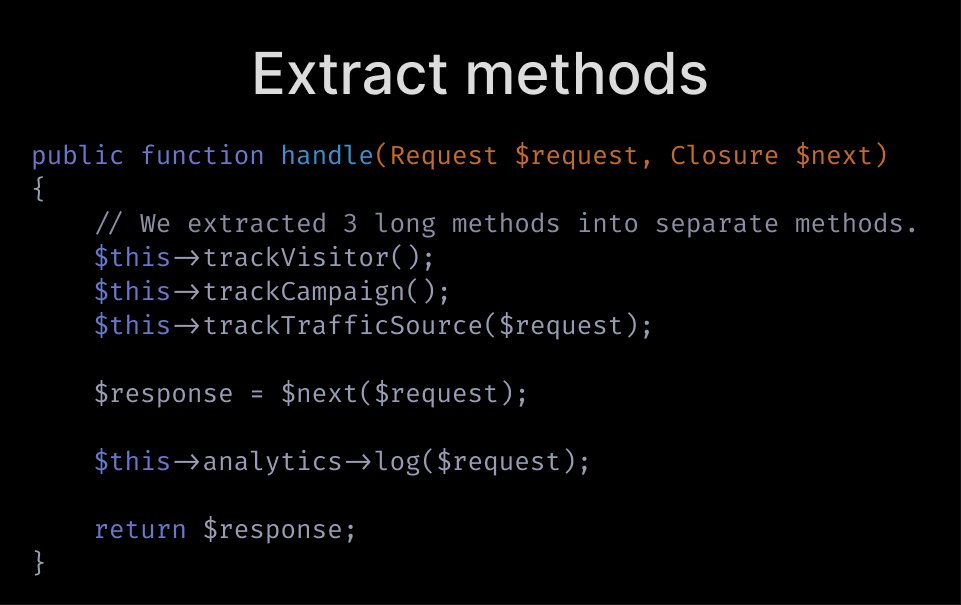 Extract methods.If some method is too long or complex, and it& #39;s hard to understand what exactly is happening, split the logic into multiple methods." title="https://abs.twimg.com/emoji/v2/... draggable="false" alt="👉" title="Rückhand Zeigefinger nach rechts" aria-label="Emoji: Rückhand Zeigefinger nach rechts"> Extract methods.If some method is too long or complex, and it& #39;s hard to understand what exactly is happening, split the logic into multiple methods." class="img-responsive" style="max-width:100%;"/>
Extract methods.If some method is too long or complex, and it& #39;s hard to understand what exactly is happening, split the logic into multiple methods." title="https://abs.twimg.com/emoji/v2/... draggable="false" alt="👉" title="Rückhand Zeigefinger nach rechts" aria-label="Emoji: Rückhand Zeigefinger nach rechts"> Extract methods.If some method is too long or complex, and it& #39;s hard to understand what exactly is happening, split the logic into multiple methods." class="img-responsive" style="max-width:100%;"/>
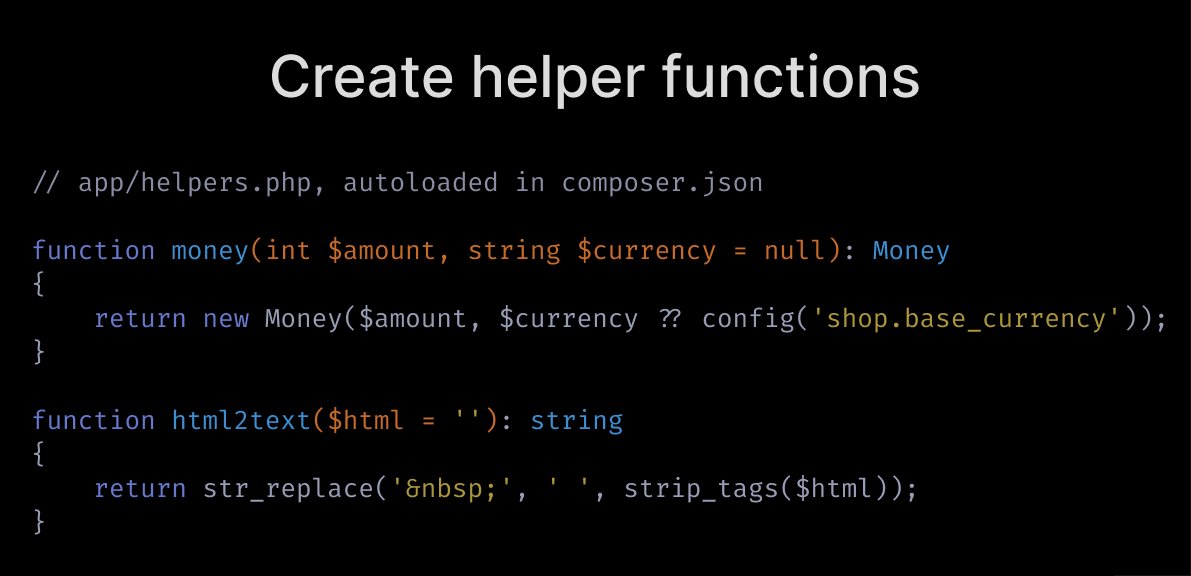 Create helper functions.If you repeat some code a lot, consider if extracting it to a helper function would make the code cleaner." title="https://abs.twimg.com/emoji/v2/... draggable="false" alt="👉" title="Rückhand Zeigefinger nach rechts" aria-label="Emoji: Rückhand Zeigefinger nach rechts"> Create helper functions.If you repeat some code a lot, consider if extracting it to a helper function would make the code cleaner." class="img-responsive" style="max-width:100%;"/>
Create helper functions.If you repeat some code a lot, consider if extracting it to a helper function would make the code cleaner." title="https://abs.twimg.com/emoji/v2/... draggable="false" alt="👉" title="Rückhand Zeigefinger nach rechts" aria-label="Emoji: Rückhand Zeigefinger nach rechts"> Create helper functions.If you repeat some code a lot, consider if extracting it to a helper function would make the code cleaner." class="img-responsive" style="max-width:100%;"/>
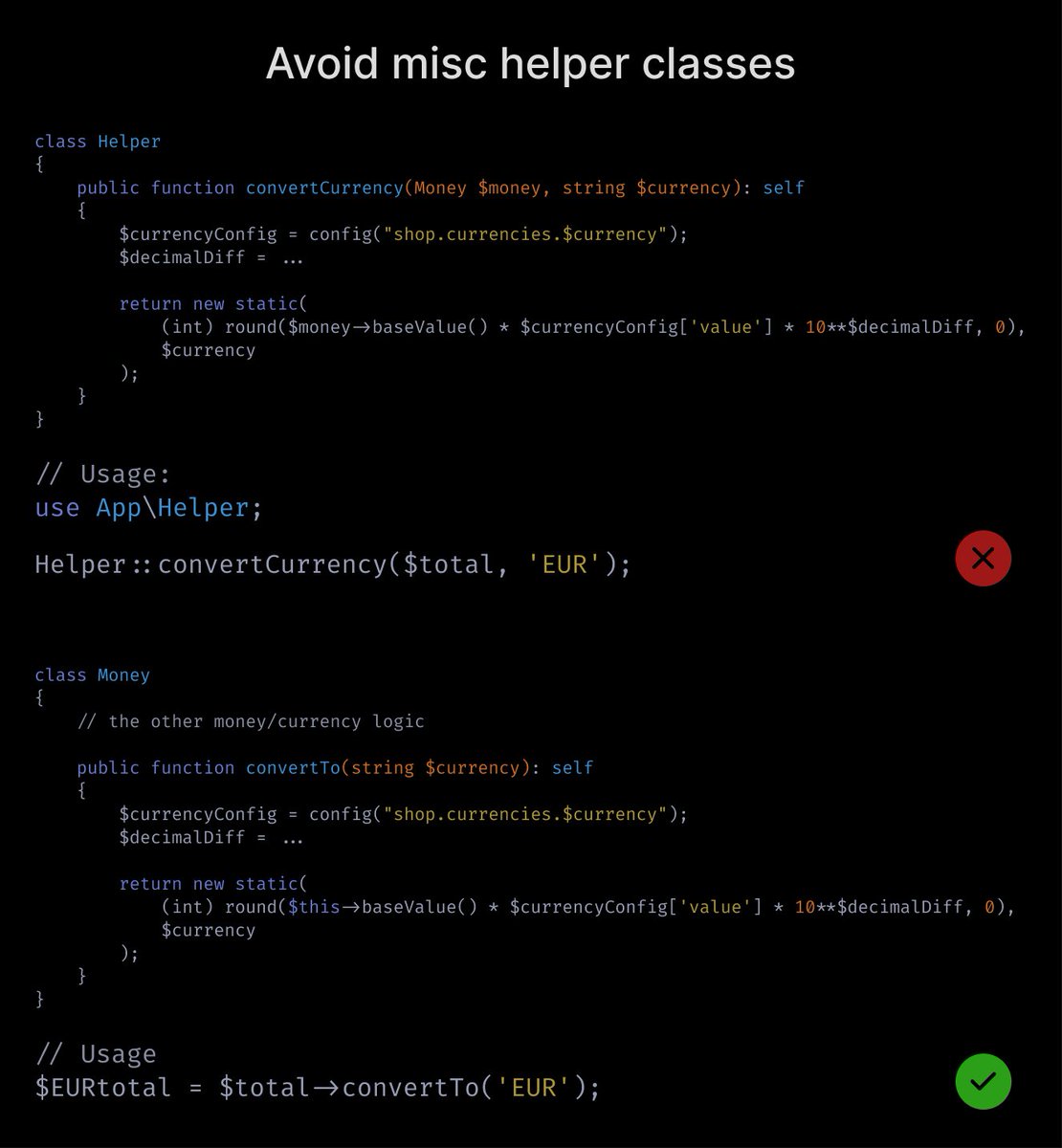 Avoid helper *classes*.Sometimes people put helpers into a class.Beware, it can get messy. This is a class with only static methods used as helper functions. It& #39;s usually better to put these methods into classes with related logic or just keep them as global functions." title="https://abs.twimg.com/emoji/v2/... draggable="false" alt="👉" title="Rückhand Zeigefinger nach rechts" aria-label="Emoji: Rückhand Zeigefinger nach rechts"> Avoid helper *classes*.Sometimes people put helpers into a class.Beware, it can get messy. This is a class with only static methods used as helper functions. It& #39;s usually better to put these methods into classes with related logic or just keep them as global functions." class="img-responsive" style="max-width:100%;"/>
Avoid helper *classes*.Sometimes people put helpers into a class.Beware, it can get messy. This is a class with only static methods used as helper functions. It& #39;s usually better to put these methods into classes with related logic or just keep them as global functions." title="https://abs.twimg.com/emoji/v2/... draggable="false" alt="👉" title="Rückhand Zeigefinger nach rechts" aria-label="Emoji: Rückhand Zeigefinger nach rechts"> Avoid helper *classes*.Sometimes people put helpers into a class.Beware, it can get messy. This is a class with only static methods used as helper functions. It& #39;s usually better to put these methods into classes with related logic or just keep them as global functions." class="img-responsive" style="max-width:100%;"/>
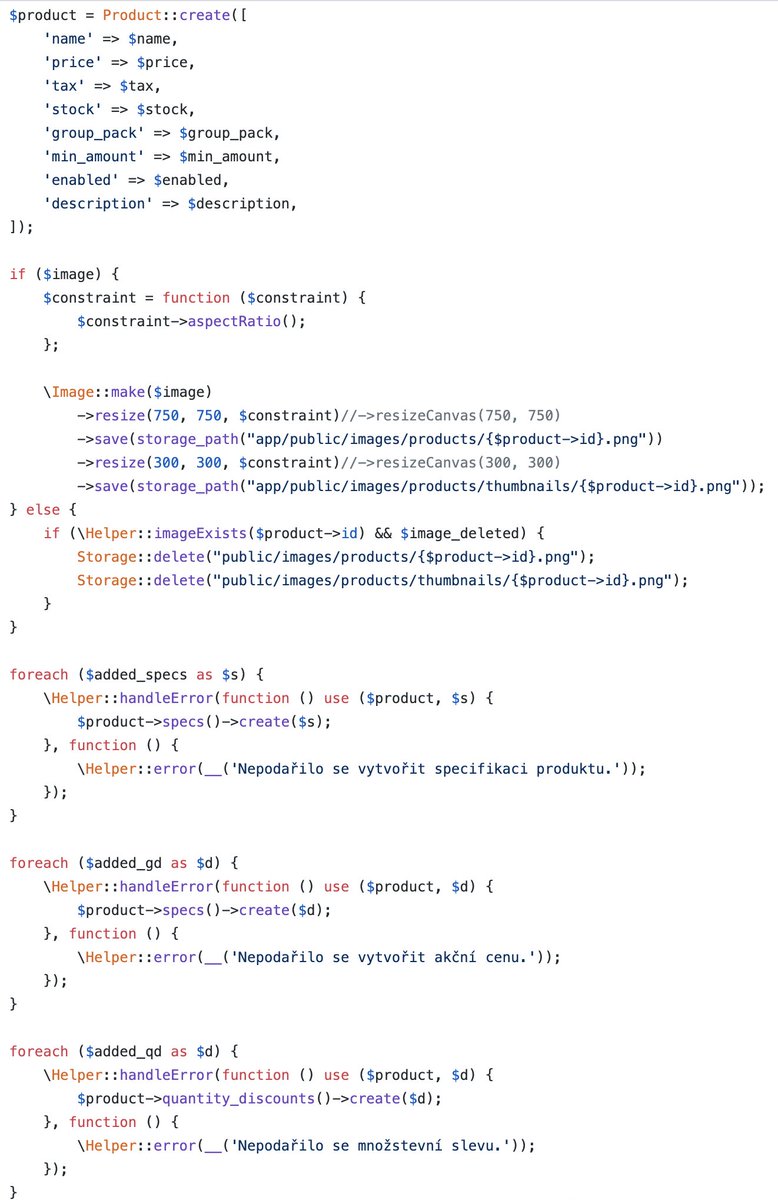 Don& #39;t just write procedural code in classes.This ties the previous tweet with the other tips here. OOP exists to make your code more readable, use it. Don& #39;t just write 400 line long procedural code in controller actions.Here& #39;s code from my first Laravel project https://abs.twimg.com/emoji/v2/... draggable="false" alt="😬" title="Grimasse schneidendes Gesicht" aria-label="Emoji: Grimasse schneidendes Gesicht">" title="https://abs.twimg.com/emoji/v2/... draggable="false" alt="👉" title="Rückhand Zeigefinger nach rechts" aria-label="Emoji: Rückhand Zeigefinger nach rechts"> Don& #39;t just write procedural code in classes.This ties the previous tweet with the other tips here. OOP exists to make your code more readable, use it. Don& #39;t just write 400 line long procedural code in controller actions.Here& #39;s code from my first Laravel project https://abs.twimg.com/emoji/v2/... draggable="false" alt="😬" title="Grimasse schneidendes Gesicht" aria-label="Emoji: Grimasse schneidendes Gesicht">" class="img-responsive" style="max-width:100%;"/>
Don& #39;t just write procedural code in classes.This ties the previous tweet with the other tips here. OOP exists to make your code more readable, use it. Don& #39;t just write 400 line long procedural code in controller actions.Here& #39;s code from my first Laravel project https://abs.twimg.com/emoji/v2/... draggable="false" alt="😬" title="Grimasse schneidendes Gesicht" aria-label="Emoji: Grimasse schneidendes Gesicht">" title="https://abs.twimg.com/emoji/v2/... draggable="false" alt="👉" title="Rückhand Zeigefinger nach rechts" aria-label="Emoji: Rückhand Zeigefinger nach rechts"> Don& #39;t just write procedural code in classes.This ties the previous tweet with the other tips here. OOP exists to make your code more readable, use it. Don& #39;t just write 400 line long procedural code in controller actions.Here& #39;s code from my first Laravel project https://abs.twimg.com/emoji/v2/... draggable="false" alt="😬" title="Grimasse schneidendes Gesicht" aria-label="Emoji: Grimasse schneidendes Gesicht">" class="img-responsive" style="max-width:100%;"/>
 Use Data Transfer Objects (DTOs).Rather than passing a huge amount of arguments in a specific order, consider creating an object with properties to store this data.Bonus points if you can find that some behavior can be moved into to this object." title="https://abs.twimg.com/emoji/v2/... draggable="false" alt="👉" title="Rückhand Zeigefinger nach rechts" aria-label="Emoji: Rückhand Zeigefinger nach rechts"> Use Data Transfer Objects (DTOs).Rather than passing a huge amount of arguments in a specific order, consider creating an object with properties to store this data.Bonus points if you can find that some behavior can be moved into to this object." class="img-responsive" style="max-width:100%;"/>
Use Data Transfer Objects (DTOs).Rather than passing a huge amount of arguments in a specific order, consider creating an object with properties to store this data.Bonus points if you can find that some behavior can be moved into to this object." title="https://abs.twimg.com/emoji/v2/... draggable="false" alt="👉" title="Rückhand Zeigefinger nach rechts" aria-label="Emoji: Rückhand Zeigefinger nach rechts"> Use Data Transfer Objects (DTOs).Rather than passing a huge amount of arguments in a specific order, consider creating an object with properties to store this data.Bonus points if you can find that some behavior can be moved into to this object." class="img-responsive" style="max-width:100%;"/>
 Create fluent objects.You can also create objects with fluent APIs. Gradually add data by with separate calls, and only require the absolute minimum in the constructor.Each method will return $this, so you can stop at any call." title="https://abs.twimg.com/emoji/v2/... draggable="false" alt="👉" title="Rückhand Zeigefinger nach rechts" aria-label="Emoji: Rückhand Zeigefinger nach rechts"> Create fluent objects.You can also create objects with fluent APIs. Gradually add data by with separate calls, and only require the absolute minimum in the constructor.Each method will return $this, so you can stop at any call." class="img-responsive" style="max-width:100%;"/>
Create fluent objects.You can also create objects with fluent APIs. Gradually add data by with separate calls, and only require the absolute minimum in the constructor.Each method will return $this, so you can stop at any call." title="https://abs.twimg.com/emoji/v2/... draggable="false" alt="👉" title="Rückhand Zeigefinger nach rechts" aria-label="Emoji: Rückhand Zeigefinger nach rechts"> Create fluent objects.You can also create objects with fluent APIs. Gradually add data by with separate calls, and only require the absolute minimum in the constructor.Each method will return $this, so you can stop at any call." class="img-responsive" style="max-width:100%;"/>
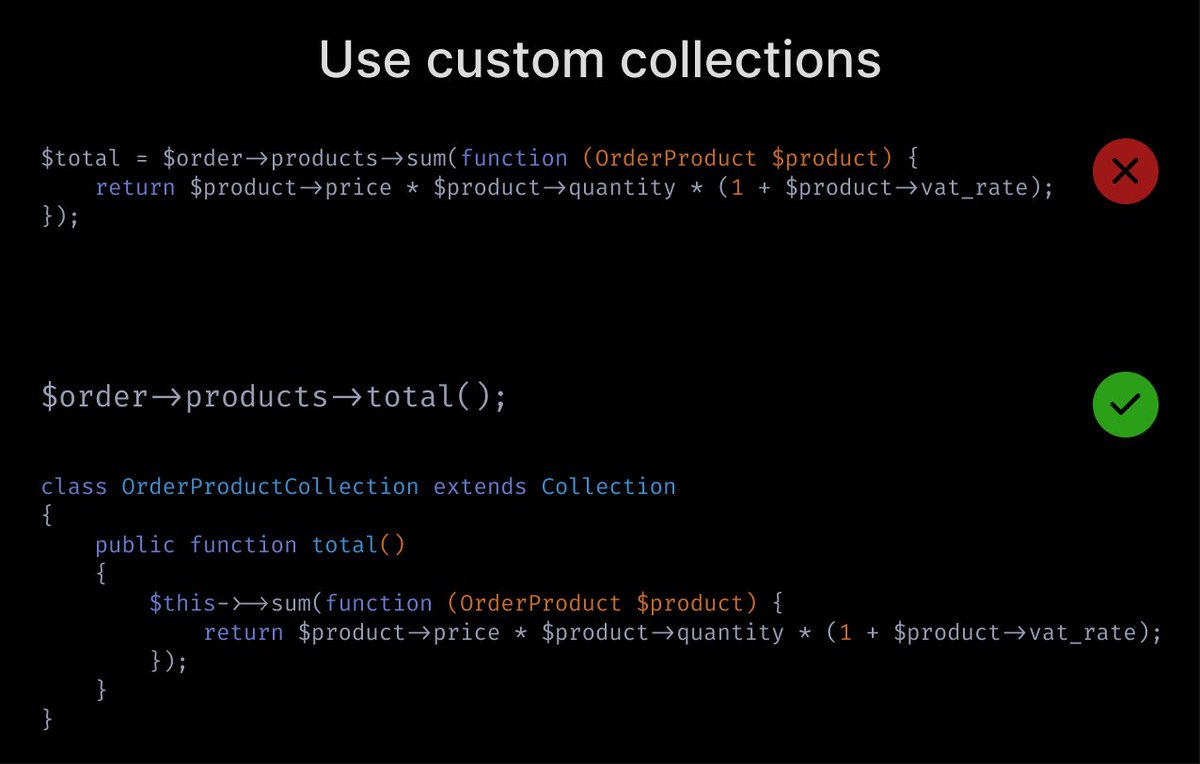 Use custom collections.Creating custom collections can be a great way to achieve more expressive syntax. Consider this example with order totals." title="https://abs.twimg.com/emoji/v2/... draggable="false" alt="👉" title="Rückhand Zeigefinger nach rechts" aria-label="Emoji: Rückhand Zeigefinger nach rechts"> Use custom collections.Creating custom collections can be a great way to achieve more expressive syntax. Consider this example with order totals." class="img-responsive" style="max-width:100%;"/>
Use custom collections.Creating custom collections can be a great way to achieve more expressive syntax. Consider this example with order totals." title="https://abs.twimg.com/emoji/v2/... draggable="false" alt="👉" title="Rückhand Zeigefinger nach rechts" aria-label="Emoji: Rückhand Zeigefinger nach rechts"> Use custom collections.Creating custom collections can be a great way to achieve more expressive syntax. Consider this example with order totals." class="img-responsive" style="max-width:100%;"/>
 Don& #39;t use abbreviations.Don& #39;t think that long variable/method names are wrong. They& #39;re not. They& #39;re expressive.Better to call a longer method than a short one and check the docblock to understand what it doesSame with variables. Don& #39;t use nonsense 3-letters abbreviations" title="https://abs.twimg.com/emoji/v2/... draggable="false" alt="👉" title="Rückhand Zeigefinger nach rechts" aria-label="Emoji: Rückhand Zeigefinger nach rechts"> Don& #39;t use abbreviations.Don& #39;t think that long variable/method names are wrong. They& #39;re not. They& #39;re expressive.Better to call a longer method than a short one and check the docblock to understand what it doesSame with variables. Don& #39;t use nonsense 3-letters abbreviations" class="img-responsive" style="max-width:100%;"/>
Don& #39;t use abbreviations.Don& #39;t think that long variable/method names are wrong. They& #39;re not. They& #39;re expressive.Better to call a longer method than a short one and check the docblock to understand what it doesSame with variables. Don& #39;t use nonsense 3-letters abbreviations" title="https://abs.twimg.com/emoji/v2/... draggable="false" alt="👉" title="Rückhand Zeigefinger nach rechts" aria-label="Emoji: Rückhand Zeigefinger nach rechts"> Don& #39;t use abbreviations.Don& #39;t think that long variable/method names are wrong. They& #39;re not. They& #39;re expressive.Better to call a longer method than a short one and check the docblock to understand what it doesSame with variables. Don& #39;t use nonsense 3-letters abbreviations" class="img-responsive" style="max-width:100%;"/>
 Use expressive names for methods.Rather than thinking "what can this object do", think about "what can be done with this object". Exceptions apply, such as with action classes, but this is a good rule of thumb. https://www.youtube.com/watch..." title="https://abs.twimg.com/emoji/v2/... draggable="false" alt="👉" title="Rückhand Zeigefinger nach rechts" aria-label="Emoji: Rückhand Zeigefinger nach rechts"> Use expressive names for methods.Rather than thinking "what can this object do", think about "what can be done with this object". Exceptions apply, such as with action classes, but this is a good rule of thumb. https://www.youtube.com/watch..." class="img-responsive" style="max-width:100%;"/>
Use expressive names for methods.Rather than thinking "what can this object do", think about "what can be done with this object". Exceptions apply, such as with action classes, but this is a good rule of thumb. https://www.youtube.com/watch..." title="https://abs.twimg.com/emoji/v2/... draggable="false" alt="👉" title="Rückhand Zeigefinger nach rechts" aria-label="Emoji: Rückhand Zeigefinger nach rechts"> Use expressive names for methods.Rather than thinking "what can this object do", think about "what can be done with this object". Exceptions apply, such as with action classes, but this is a good rule of thumb. https://www.youtube.com/watch..." class="img-responsive" style="max-width:100%;"/>
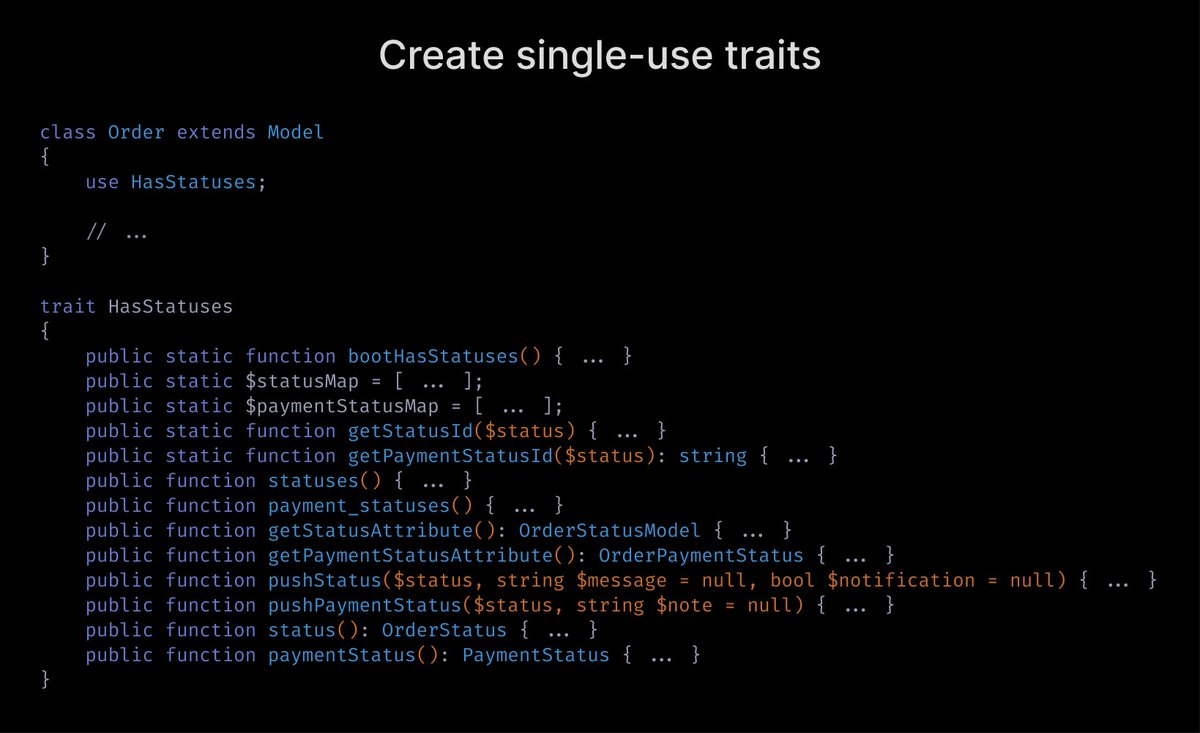 Create single-use traitsAdding methods to classes where they belong is cleaner than creating action classes for everything, but it can make the classes grow bigConsider using traits. They& #39;re meant *primarily* for code reuse, but there& #39;s nothing wrong with single-use traits" title="https://abs.twimg.com/emoji/v2/... draggable="false" alt="👉" title="Rückhand Zeigefinger nach rechts" aria-label="Emoji: Rückhand Zeigefinger nach rechts"> Create single-use traitsAdding methods to classes where they belong is cleaner than creating action classes for everything, but it can make the classes grow bigConsider using traits. They& #39;re meant *primarily* for code reuse, but there& #39;s nothing wrong with single-use traits" class="img-responsive" style="max-width:100%;"/>
Create single-use traitsAdding methods to classes where they belong is cleaner than creating action classes for everything, but it can make the classes grow bigConsider using traits. They& #39;re meant *primarily* for code reuse, but there& #39;s nothing wrong with single-use traits" title="https://abs.twimg.com/emoji/v2/... draggable="false" alt="👉" title="Rückhand Zeigefinger nach rechts" aria-label="Emoji: Rückhand Zeigefinger nach rechts"> Create single-use traitsAdding methods to classes where they belong is cleaner than creating action classes for everything, but it can make the classes grow bigConsider using traits. They& #39;re meant *primarily* for code reuse, but there& #39;s nothing wrong with single-use traits" class="img-responsive" style="max-width:100%;"/>
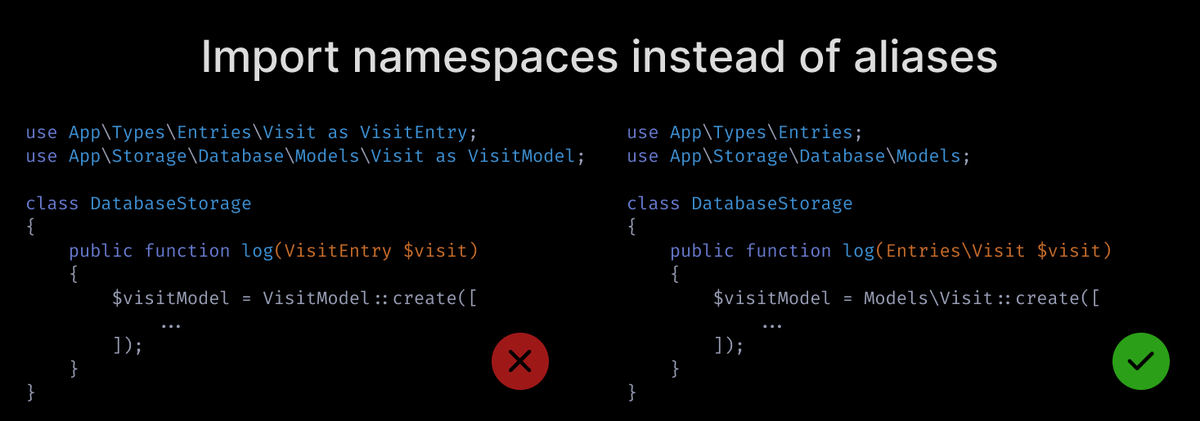 Import namespaces instead of using aliasesSometimes you may have multiple classes with the same name. Rather than importing them with an alias, import the namespaces." title="https://abs.twimg.com/emoji/v2/... draggable="false" alt="👉" title="Rückhand Zeigefinger nach rechts" aria-label="Emoji: Rückhand Zeigefinger nach rechts"> Import namespaces instead of using aliasesSometimes you may have multiple classes with the same name. Rather than importing them with an alias, import the namespaces." class="img-responsive" style="max-width:100%;"/>
Import namespaces instead of using aliasesSometimes you may have multiple classes with the same name. Rather than importing them with an alias, import the namespaces." title="https://abs.twimg.com/emoji/v2/... draggable="false" alt="👉" title="Rückhand Zeigefinger nach rechts" aria-label="Emoji: Rückhand Zeigefinger nach rechts"> Import namespaces instead of using aliasesSometimes you may have multiple classes with the same name. Rather than importing them with an alias, import the namespaces." class="img-responsive" style="max-width:100%;"/>
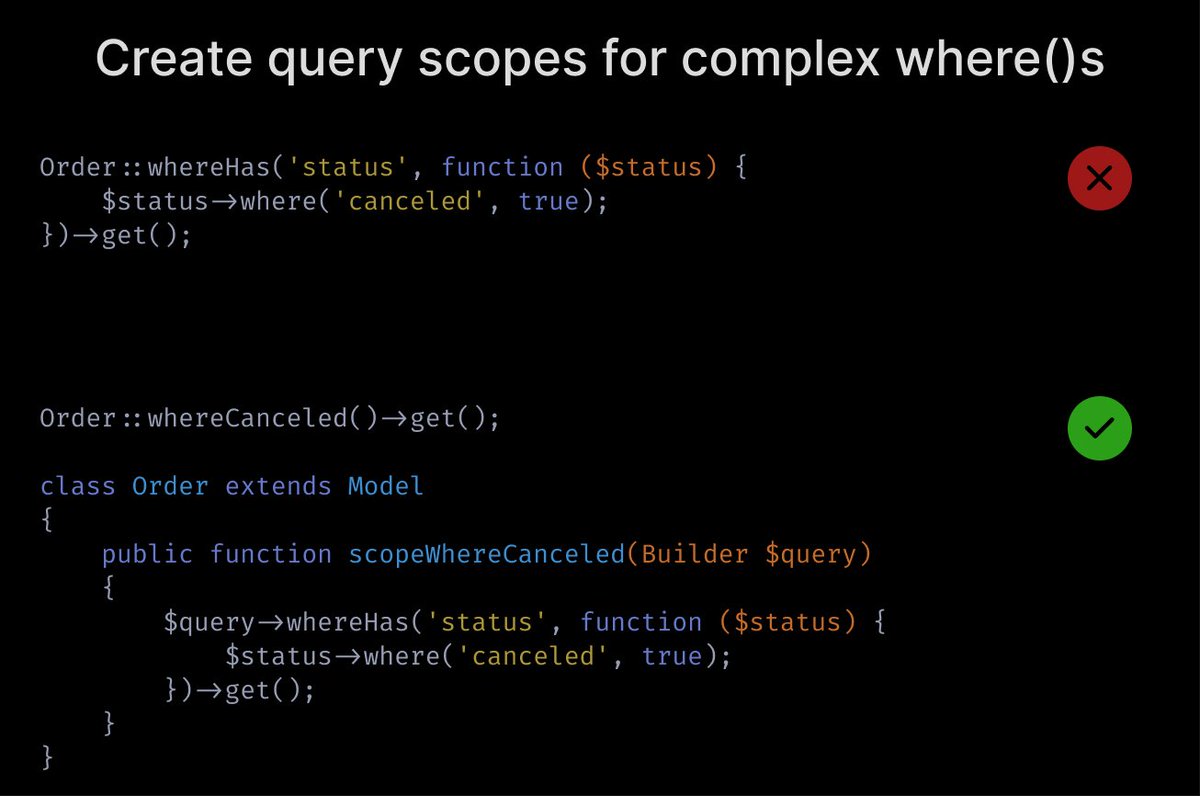 Create query scopes for complex where()s.Rather than writing complex where() clauses, create query scopes with expressive names.This will make your e.g. controllers have to know less about the database structure and your code will be cleaner." title="https://abs.twimg.com/emoji/v2/... draggable="false" alt="👉" title="Rückhand Zeigefinger nach rechts" aria-label="Emoji: Rückhand Zeigefinger nach rechts"> Create query scopes for complex where()s.Rather than writing complex where() clauses, create query scopes with expressive names.This will make your e.g. controllers have to know less about the database structure and your code will be cleaner." class="img-responsive" style="max-width:100%;"/>
Create query scopes for complex where()s.Rather than writing complex where() clauses, create query scopes with expressive names.This will make your e.g. controllers have to know less about the database structure and your code will be cleaner." title="https://abs.twimg.com/emoji/v2/... draggable="false" alt="👉" title="Rückhand Zeigefinger nach rechts" aria-label="Emoji: Rückhand Zeigefinger nach rechts"> Create query scopes for complex where()s.Rather than writing complex where() clauses, create query scopes with expressive names.This will make your e.g. controllers have to know less about the database structure and your code will be cleaner." class="img-responsive" style="max-width:100%;"/>
 Don& #39;t use model methods to retrieve dataIf you want to retrieve some data from a model, create an accessor.Keep methods for things that *change* the model in some way." title="https://abs.twimg.com/emoji/v2/... draggable="false" alt="👉" title="Rückhand Zeigefinger nach rechts" aria-label="Emoji: Rückhand Zeigefinger nach rechts"> Don& #39;t use model methods to retrieve dataIf you want to retrieve some data from a model, create an accessor.Keep methods for things that *change* the model in some way." class="img-responsive" style="max-width:100%;"/>
Don& #39;t use model methods to retrieve dataIf you want to retrieve some data from a model, create an accessor.Keep methods for things that *change* the model in some way." title="https://abs.twimg.com/emoji/v2/... draggable="false" alt="👉" title="Rückhand Zeigefinger nach rechts" aria-label="Emoji: Rückhand Zeigefinger nach rechts"> Don& #39;t use model methods to retrieve dataIf you want to retrieve some data from a model, create an accessor.Keep methods for things that *change* the model in some way." class="img-responsive" style="max-width:100%;"/>
 Use custom config files.You can store things like "results per page" in config files. Don& #39;t add them to the app config file though. Create your own. In my e-commerce project, I use config/shop.php." title="https://abs.twimg.com/emoji/v2/... draggable="false" alt="💡" title="Elektrische Glühbirne" aria-label="Emoji: Elektrische Glühbirne"> Use custom config files.You can store things like "results per page" in config files. Don& #39;t add them to the app config file though. Create your own. In my e-commerce project, I use config/shop.php." class="img-responsive" style="max-width:100%;"/>
Use custom config files.You can store things like "results per page" in config files. Don& #39;t add them to the app config file though. Create your own. In my e-commerce project, I use config/shop.php." title="https://abs.twimg.com/emoji/v2/... draggable="false" alt="💡" title="Elektrische Glühbirne" aria-label="Emoji: Elektrische Glühbirne"> Use custom config files.You can store things like "results per page" in config files. Don& #39;t add them to the app config file though. Create your own. In my e-commerce project, I use config/shop.php." class="img-responsive" style="max-width:100%;"/>
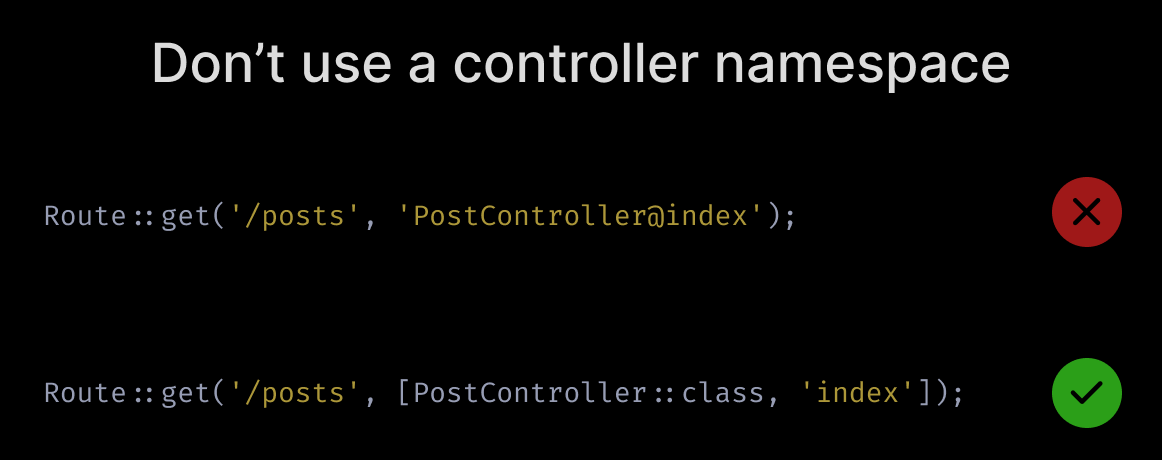 Don& #39;t use a controller namespaceInstead of writing controller actions like PostController@index, use the callable array syntax [PostController::class, & #39;index& #39;].You will be able to navigate to the class by clicking PostController." title="https://abs.twimg.com/emoji/v2/... draggable="false" alt="👉" title="Rückhand Zeigefinger nach rechts" aria-label="Emoji: Rückhand Zeigefinger nach rechts"> Don& #39;t use a controller namespaceInstead of writing controller actions like PostController@index, use the callable array syntax [PostController::class, & #39;index& #39;].You will be able to navigate to the class by clicking PostController." class="img-responsive" style="max-width:100%;"/>
Don& #39;t use a controller namespaceInstead of writing controller actions like PostController@index, use the callable array syntax [PostController::class, & #39;index& #39;].You will be able to navigate to the class by clicking PostController." title="https://abs.twimg.com/emoji/v2/... draggable="false" alt="👉" title="Rückhand Zeigefinger nach rechts" aria-label="Emoji: Rückhand Zeigefinger nach rechts"> Don& #39;t use a controller namespaceInstead of writing controller actions like PostController@index, use the callable array syntax [PostController::class, & #39;index& #39;].You will be able to navigate to the class by clicking PostController." class="img-responsive" style="max-width:100%;"/>
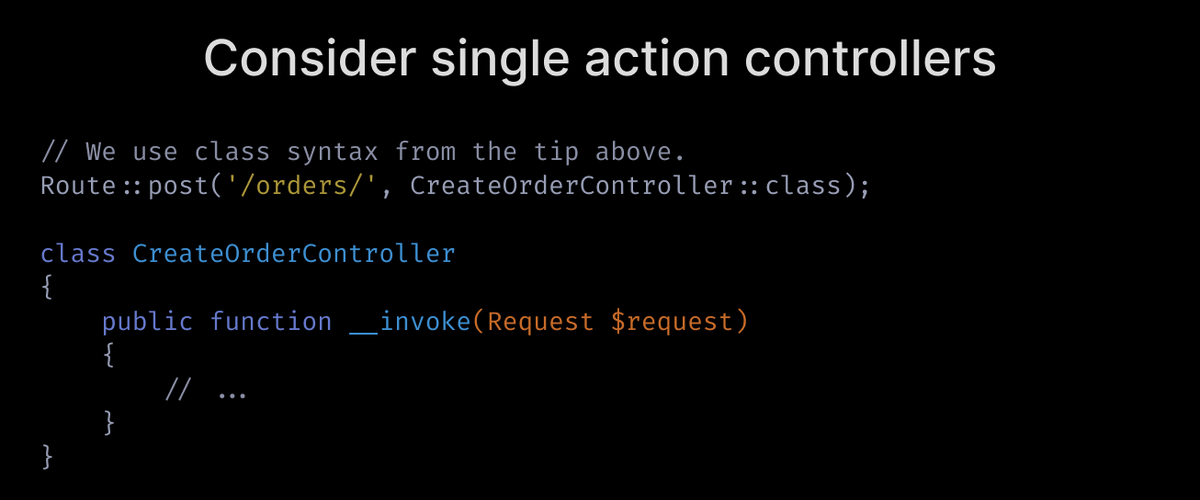 Consider single-action controllersIf you have a complex route action, consider moving it to a separate controller.For OrderController::create, you& #39;d create CreateOrderController.Another solution is to move that logic to an action class — do what works best in your case." title="https://abs.twimg.com/emoji/v2/... draggable="false" alt="👉" title="Rückhand Zeigefinger nach rechts" aria-label="Emoji: Rückhand Zeigefinger nach rechts"> Consider single-action controllersIf you have a complex route action, consider moving it to a separate controller.For OrderController::create, you& #39;d create CreateOrderController.Another solution is to move that logic to an action class — do what works best in your case." class="img-responsive" style="max-width:100%;"/>
Consider single-action controllersIf you have a complex route action, consider moving it to a separate controller.For OrderController::create, you& #39;d create CreateOrderController.Another solution is to move that logic to an action class — do what works best in your case." title="https://abs.twimg.com/emoji/v2/... draggable="false" alt="👉" title="Rückhand Zeigefinger nach rechts" aria-label="Emoji: Rückhand Zeigefinger nach rechts"> Consider single-action controllersIf you have a complex route action, consider moving it to a separate controller.For OrderController::create, you& #39;d create CreateOrderController.Another solution is to move that logic to an action class — do what works best in your case." class="img-responsive" style="max-width:100%;"/>
 Be friends with your IDE.Install extensions, write annotations, use typehints. Your IDE will help you with getting your code working correctly, which lets you spend more energy on writing code that& #39;s also readable." title="https://abs.twimg.com/emoji/v2/... draggable="false" alt="💡" title="Elektrische Glühbirne" aria-label="Emoji: Elektrische Glühbirne"> Be friends with your IDE.Install extensions, write annotations, use typehints. Your IDE will help you with getting your code working correctly, which lets you spend more energy on writing code that& #39;s also readable." class="img-responsive" style="max-width:100%;"/>
Be friends with your IDE.Install extensions, write annotations, use typehints. Your IDE will help you with getting your code working correctly, which lets you spend more energy on writing code that& #39;s also readable." title="https://abs.twimg.com/emoji/v2/... draggable="false" alt="💡" title="Elektrische Glühbirne" aria-label="Emoji: Elektrische Glühbirne"> Be friends with your IDE.Install extensions, write annotations, use typehints. Your IDE will help you with getting your code working correctly, which lets you spend more energy on writing code that& #39;s also readable." class="img-responsive" style="max-width:100%;"/>
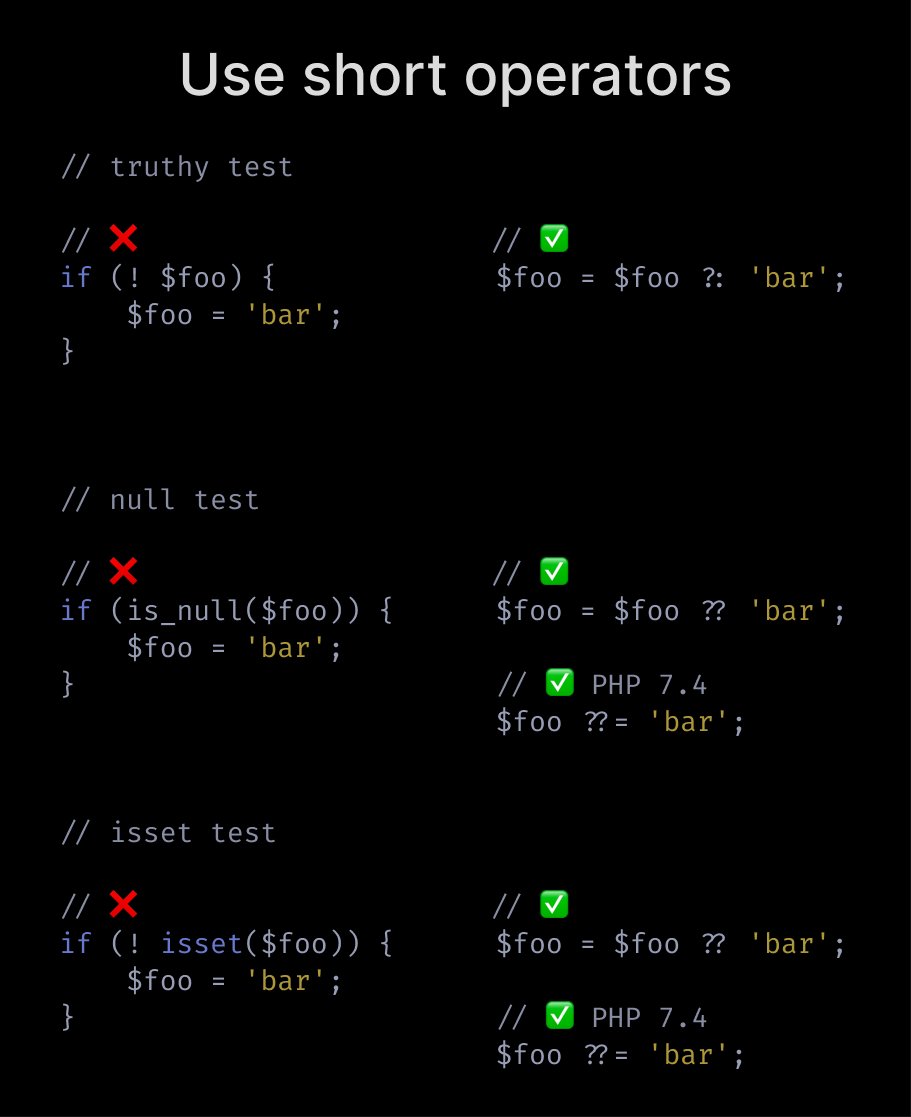 Use short operators.PHP has many great operators that can replace ugly if checks. Memorize them." title="https://abs.twimg.com/emoji/v2/... draggable="false" alt="👉" title="Rückhand Zeigefinger nach rechts" aria-label="Emoji: Rückhand Zeigefinger nach rechts"> Use short operators.PHP has many great operators that can replace ugly if checks. Memorize them." class="img-responsive" style="max-width:100%;"/>
Use short operators.PHP has many great operators that can replace ugly if checks. Memorize them." title="https://abs.twimg.com/emoji/v2/... draggable="false" alt="👉" title="Rückhand Zeigefinger nach rechts" aria-label="Emoji: Rückhand Zeigefinger nach rechts"> Use short operators.PHP has many great operators that can replace ugly if checks. Memorize them." class="img-responsive" style="max-width:100%;"/>
 Consider using helpers instead of facades. They can clean things up.This is largely a matter of personal preference, but calling a global function instead of having to import a class and statically call a method feels nicer to me.Bonus points for session(& #39;key& #39;) syntax." title="https://abs.twimg.com/emoji/v2/... draggable="false" alt="👉" title="Rückhand Zeigefinger nach rechts" aria-label="Emoji: Rückhand Zeigefinger nach rechts"> Consider using helpers instead of facades. They can clean things up.This is largely a matter of personal preference, but calling a global function instead of having to import a class and statically call a method feels nicer to me.Bonus points for session(& #39;key& #39;) syntax." class="img-responsive" style="max-width:100%;"/>
Consider using helpers instead of facades. They can clean things up.This is largely a matter of personal preference, but calling a global function instead of having to import a class and statically call a method feels nicer to me.Bonus points for session(& #39;key& #39;) syntax." title="https://abs.twimg.com/emoji/v2/... draggable="false" alt="👉" title="Rückhand Zeigefinger nach rechts" aria-label="Emoji: Rückhand Zeigefinger nach rechts"> Consider using helpers instead of facades. They can clean things up.This is largely a matter of personal preference, but calling a global function instead of having to import a class and statically call a method feels nicer to me.Bonus points for session(& #39;key& #39;) syntax." class="img-responsive" style="max-width:100%;"/>
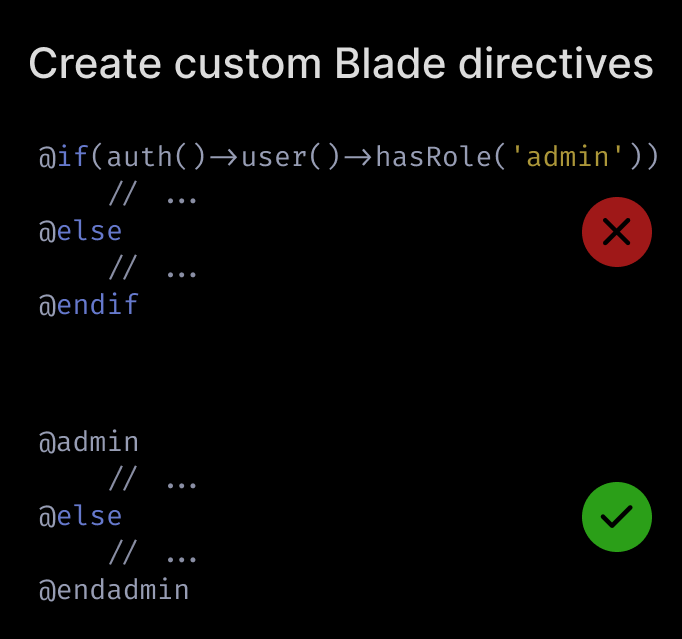 Create custom Blade directives for business logic.You can make your Blade templates more expressive by creating custom directives. For example, rather than checking if the user has the admin role, you could use @admin." title="https://abs.twimg.com/emoji/v2/... draggable="false" alt="👉" title="Rückhand Zeigefinger nach rechts" aria-label="Emoji: Rückhand Zeigefinger nach rechts"> Create custom Blade directives for business logic.You can make your Blade templates more expressive by creating custom directives. For example, rather than checking if the user has the admin role, you could use @admin." class="img-responsive" style="max-width:100%;"/>
Create custom Blade directives for business logic.You can make your Blade templates more expressive by creating custom directives. For example, rather than checking if the user has the admin role, you could use @admin." title="https://abs.twimg.com/emoji/v2/... draggable="false" alt="👉" title="Rückhand Zeigefinger nach rechts" aria-label="Emoji: Rückhand Zeigefinger nach rechts"> Create custom Blade directives for business logic.You can make your Blade templates more expressive by creating custom directives. For example, rather than checking if the user has the admin role, you could use @admin." class="img-responsive" style="max-width:100%;"/>
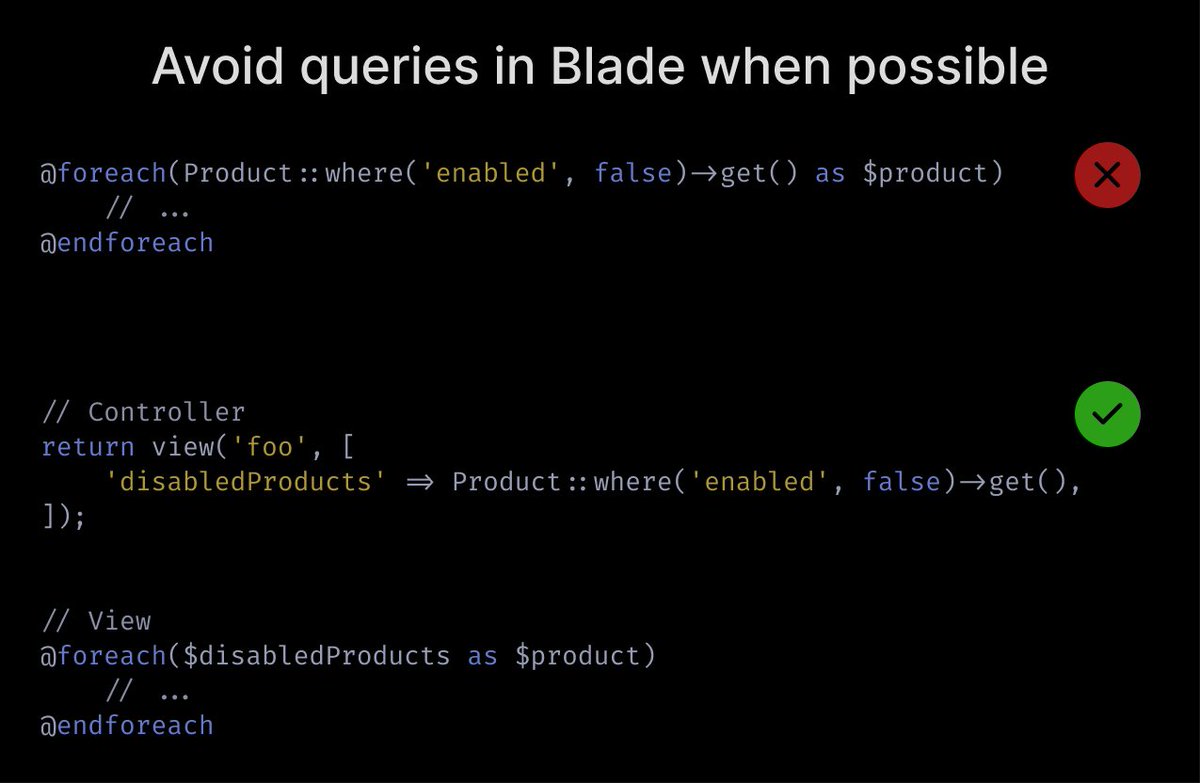 Avoid queries in Blade when possibleSometimes you may want to execute DB queries in blade. There are some ok use cases for this, such as in layout files.But if it& #39;s a view returned by a controller, pass the data in the view data instead." title="https://abs.twimg.com/emoji/v2/... draggable="false" alt="👉" title="Rückhand Zeigefinger nach rechts" aria-label="Emoji: Rückhand Zeigefinger nach rechts"> Avoid queries in Blade when possibleSometimes you may want to execute DB queries in blade. There are some ok use cases for this, such as in layout files.But if it& #39;s a view returned by a controller, pass the data in the view data instead." class="img-responsive" style="max-width:100%;"/>
Avoid queries in Blade when possibleSometimes you may want to execute DB queries in blade. There are some ok use cases for this, such as in layout files.But if it& #39;s a view returned by a controller, pass the data in the view data instead." title="https://abs.twimg.com/emoji/v2/... draggable="false" alt="👉" title="Rückhand Zeigefinger nach rechts" aria-label="Emoji: Rückhand Zeigefinger nach rechts"> Avoid queries in Blade when possibleSometimes you may want to execute DB queries in blade. There are some ok use cases for this, such as in layout files.But if it& #39;s a view returned by a controller, pass the data in the view data instead." class="img-responsive" style="max-width:100%;"/>
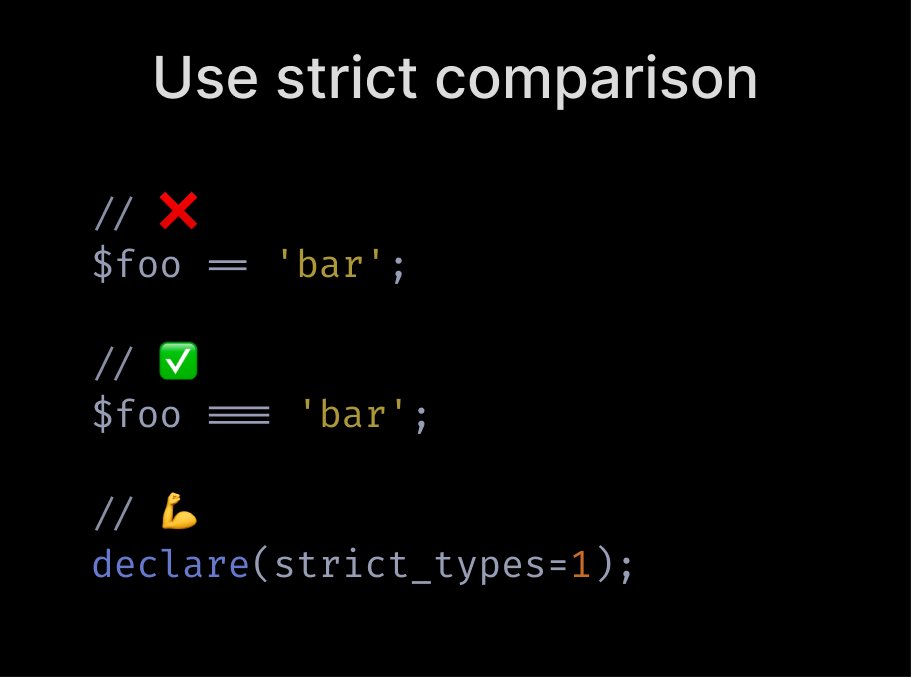 Use strict comparison.ALWAYS use strict comparison (=== and !==). If needed, cast things go the correct type before comparing. Better than weird == resultsAlso consider enabling strict types in your code. This will prevent passing variables of wrong data types to functions" title="https://abs.twimg.com/emoji/v2/... draggable="false" alt="👉" title="Rückhand Zeigefinger nach rechts" aria-label="Emoji: Rückhand Zeigefinger nach rechts"> Use strict comparison.ALWAYS use strict comparison (=== and !==). If needed, cast things go the correct type before comparing. Better than weird == resultsAlso consider enabling strict types in your code. This will prevent passing variables of wrong data types to functions" class="img-responsive" style="max-width:100%;"/>
Use strict comparison.ALWAYS use strict comparison (=== and !==). If needed, cast things go the correct type before comparing. Better than weird == resultsAlso consider enabling strict types in your code. This will prevent passing variables of wrong data types to functions" title="https://abs.twimg.com/emoji/v2/... draggable="false" alt="👉" title="Rückhand Zeigefinger nach rechts" aria-label="Emoji: Rückhand Zeigefinger nach rechts"> Use strict comparison.ALWAYS use strict comparison (=== and !==). If needed, cast things go the correct type before comparing. Better than weird == resultsAlso consider enabling strict types in your code. This will prevent passing variables of wrong data types to functions" class="img-responsive" style="max-width:100%;"/>
 Use docblocks only when they clarify things.Many people will disagree with this, because they do it. But it makes no sense.There& #39;s no point in using docblocks when they don& #39;t give any extra information. If the typehint is enough, don& #39;t add a docblock.That& #39;s just noise." title="https://abs.twimg.com/emoji/v2/... draggable="false" alt="👉" title="Rückhand Zeigefinger nach rechts" aria-label="Emoji: Rückhand Zeigefinger nach rechts"> Use docblocks only when they clarify things.Many people will disagree with this, because they do it. But it makes no sense.There& #39;s no point in using docblocks when they don& #39;t give any extra information. If the typehint is enough, don& #39;t add a docblock.That& #39;s just noise." class="img-responsive" style="max-width:100%;"/>
Use docblocks only when they clarify things.Many people will disagree with this, because they do it. But it makes no sense.There& #39;s no point in using docblocks when they don& #39;t give any extra information. If the typehint is enough, don& #39;t add a docblock.That& #39;s just noise." title="https://abs.twimg.com/emoji/v2/... draggable="false" alt="👉" title="Rückhand Zeigefinger nach rechts" aria-label="Emoji: Rückhand Zeigefinger nach rechts"> Use docblocks only when they clarify things.Many people will disagree with this, because they do it. But it makes no sense.There& #39;s no point in using docblocks when they don& #39;t give any extra information. If the typehint is enough, don& #39;t add a docblock.That& #39;s just noise." class="img-responsive" style="max-width:100%;"/>
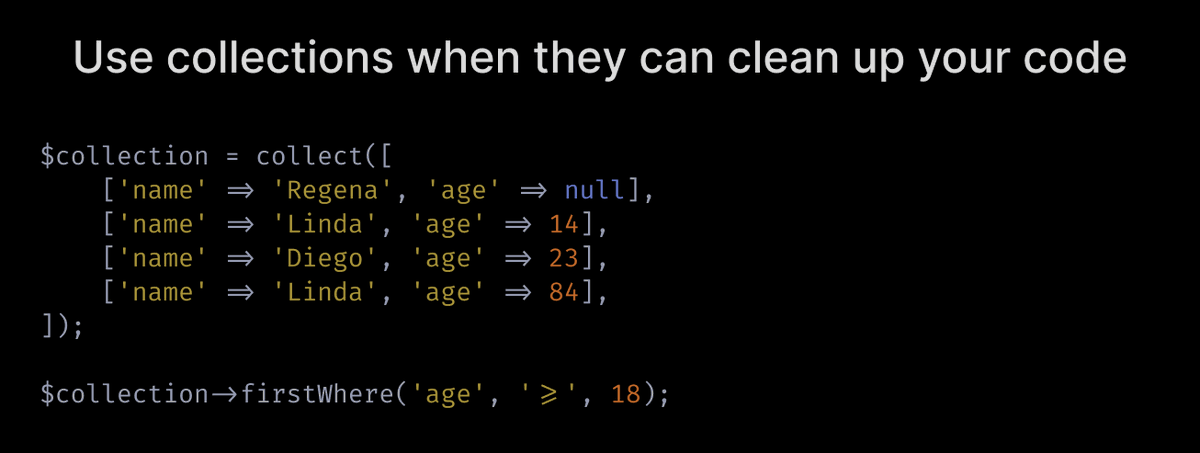 Use collections when they can clean up your code.Don& #39;t turn all arrays into collections just because Laravel offers them, but DO turn arrays into collections when you can make use of collection syntax to clean up your code." title="https://abs.twimg.com/emoji/v2/... draggable="false" alt="👉" title="Rückhand Zeigefinger nach rechts" aria-label="Emoji: Rückhand Zeigefinger nach rechts"> Use collections when they can clean up your code.Don& #39;t turn all arrays into collections just because Laravel offers them, but DO turn arrays into collections when you can make use of collection syntax to clean up your code." class="img-responsive" style="max-width:100%;"/>
Use collections when they can clean up your code.Don& #39;t turn all arrays into collections just because Laravel offers them, but DO turn arrays into collections when you can make use of collection syntax to clean up your code." title="https://abs.twimg.com/emoji/v2/... draggable="false" alt="👉" title="Rückhand Zeigefinger nach rechts" aria-label="Emoji: Rückhand Zeigefinger nach rechts"> Use collections when they can clean up your code.Don& #39;t turn all arrays into collections just because Laravel offers them, but DO turn arrays into collections when you can make use of collection syntax to clean up your code." class="img-responsive" style="max-width:100%;"/>
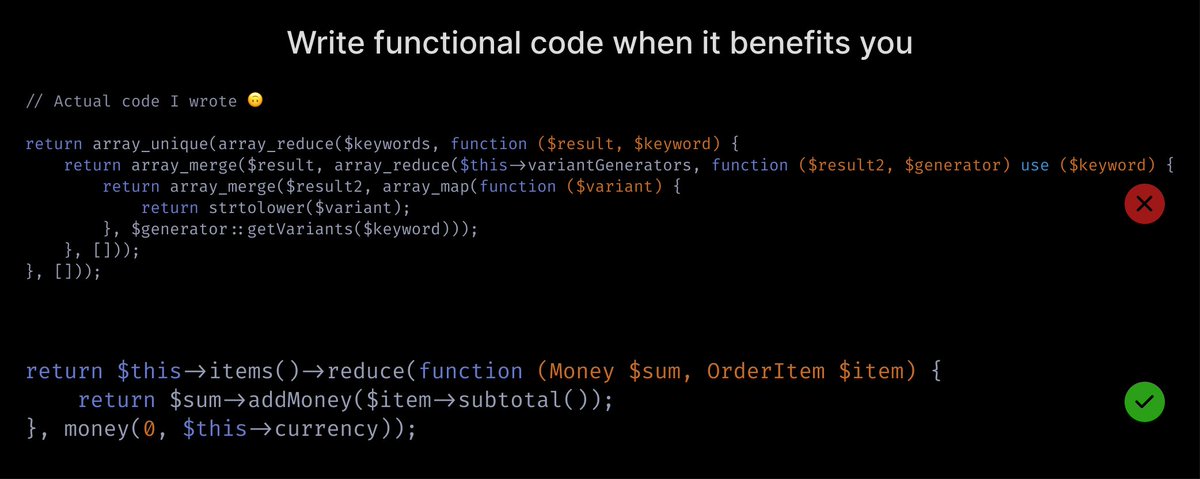 Write functional code when it benefits you.Functional code can both clean things up and make them impossible to understand. Refactor common loops into functional calls, but don& #39;t write stupidly complex reduce()s just to avoid writing a loop. There& #39;s a use case for both." title="https://abs.twimg.com/emoji/v2/... draggable="false" alt="👉" title="Rückhand Zeigefinger nach rechts" aria-label="Emoji: Rückhand Zeigefinger nach rechts"> Write functional code when it benefits you.Functional code can both clean things up and make them impossible to understand. Refactor common loops into functional calls, but don& #39;t write stupidly complex reduce()s just to avoid writing a loop. There& #39;s a use case for both." class="img-responsive" style="max-width:100%;"/>
Write functional code when it benefits you.Functional code can both clean things up and make them impossible to understand. Refactor common loops into functional calls, but don& #39;t write stupidly complex reduce()s just to avoid writing a loop. There& #39;s a use case for both." title="https://abs.twimg.com/emoji/v2/... draggable="false" alt="👉" title="Rückhand Zeigefinger nach rechts" aria-label="Emoji: Rückhand Zeigefinger nach rechts"> Write functional code when it benefits you.Functional code can both clean things up and make them impossible to understand. Refactor common loops into functional calls, but don& #39;t write stupidly complex reduce()s just to avoid writing a loop. There& #39;s a use case for both." class="img-responsive" style="max-width:100%;"/>
 Context matters.Above I said that moving business logic to action/service classes is good. But context mattersHere& #39;s code design advice from a popular "Laravel best practices" repo. There& #39;s absolutely no reason to put a 3-line check into a class. That& #39;s just overengineered" title="https://abs.twimg.com/emoji/v2/... draggable="false" alt="💡" title="Elektrische Glühbirne" aria-label="Emoji: Elektrische Glühbirne"> Context matters.Above I said that moving business logic to action/service classes is good. But context mattersHere& #39;s code design advice from a popular "Laravel best practices" repo. There& #39;s absolutely no reason to put a 3-line check into a class. That& #39;s just overengineered" class="img-responsive" style="max-width:100%;"/>
Context matters.Above I said that moving business logic to action/service classes is good. But context mattersHere& #39;s code design advice from a popular "Laravel best practices" repo. There& #39;s absolutely no reason to put a 3-line check into a class. That& #39;s just overengineered" title="https://abs.twimg.com/emoji/v2/... draggable="false" alt="💡" title="Elektrische Glühbirne" aria-label="Emoji: Elektrische Glühbirne"> Context matters.Above I said that moving business logic to action/service classes is good. But context mattersHere& #39;s code design advice from a popular "Laravel best practices" repo. There& #39;s absolutely no reason to put a 3-line check into a class. That& #39;s just overengineered" class="img-responsive" style="max-width:100%;"/>


